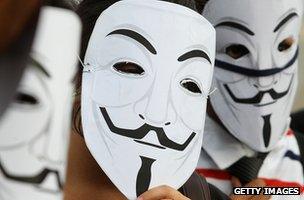Anonymous linked to Japan's government websites attacks
- Published

Anonymous claimed responsibility for a number of attacks on government websites around the world
A series of cyber-attacks have led to a number of Japanese government websites being temporarily taken offline.
A Twitter feed, @op_japan, associated with hacking collective Anonymous claimed responsibility, reacting to the country's new anti-piracy bill.
The new law outlines jail terms for those who download copyrighted content.
This would "result in scores of unnecessary prison sentences to numerous innocent citizens", the Anonymous website stated on Monday.
The websites - of Japan's Finance Ministry, Supreme Court and political parties DPJ and LDP - are now back up.
The new law says "downloading of copyrighted works knowing that they are not free and that it is illegal" could result in a fine of up to two million yen ($25,300; £16,184) or a prison sentence of up to two years - or both.
Ministry official Takanari Horino said a number of the Finance Ministry's web pages had been defaced on Tuesday and an unauthorised link posted on the site.
Free society
"We are aware of the Anonymous statement referring to the new copyright law, but we don't know at this point if the cyber-attacks are linked to the group," he added.
A statement on the website believed to be run by members of Anonymous, anonpr.net, said anti-piracy bills passed last week in Japan would do "little to solve the underlying problem of legitimate copyright infringement".
"The content industry is now pushing ISPs [internet service providers] in Japan to implement surveillance technology that will spy on... every single internet user," it added.
"This would be an unprecedented approach and severely reduce the amount of privacy law abiding citizens should have in a free society."
Staged protests
According to the Recording Industry Association of Japan, 4.36 billion files were illegally downloaded in the country in 2010.
In early June, members of Anonymous staged protests in 16 cities in India, against what they said was internet censorship in the country.
India's Madras High Court has since changed its earlier censorship order, which centred on the issue of internet copyright, making it once again possible for web users to access video and file-sharing sites, including The Pirate Bay.
In April, Anonymous also claimed responsibility for defacing almost 500 websites in China, including government sites and those of official agencies and trade groups.
- Published25 June 2012
- Published9 June 2012
- Published5 April 2012
- Published20 February 2012
- Published3 January 2012